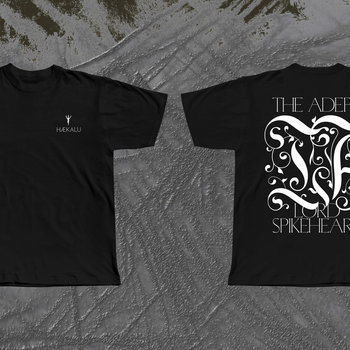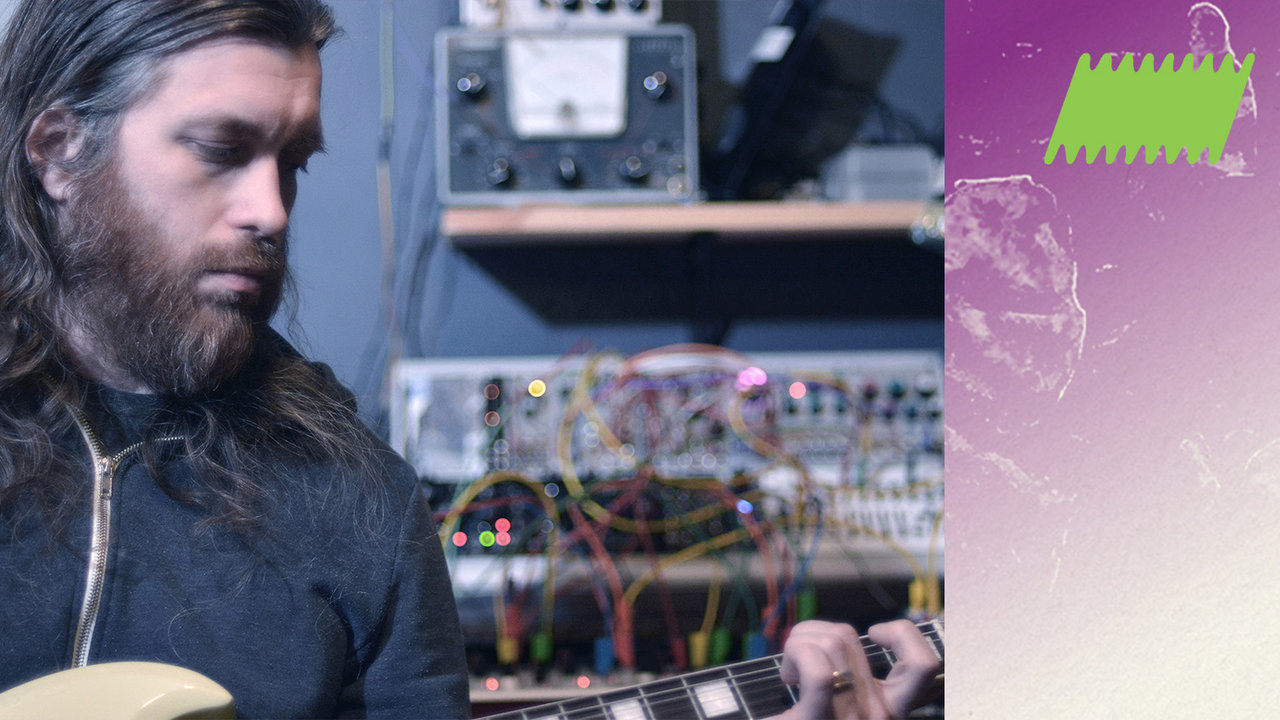 Photo by Ronald Dick
Photo by Ronald Dick
“It’s a very loving, positive, and uplifting record,” says Martin Kanja, better known as Lord Spikeheart, of his debut solo album The Adept. It’s almost unbelievable; Kanja fronted extreme duo Duma (the band has recently split up), exploring the darkest and most extreme corners of metal and experimental electronic music, and the sound of The Adept is just as extreme. “The positivity and joy is masked in a cloud of heaviness and mosh pit vibrations, but it’s all positive. It’s not happy chords and stuff, I know,” he laughs.







Vinyl LP, T-Shirt/Shirt




In Duma, Kanja expressed his anger towards the capitalist status quo while also tackling his personal demons—“My previous music was mostly about myself and what I was going through” he says. On The Adept he took a more outward-looking approach. “It’s a record against daily oppression. I wrote it as a reply to all the oppressive things around—exploitation, victimization. I want to encourage people to stand up to be proud of themselves.” Sometimes even more extreme than his work with his previous band, Martin’s solo album is filled with distorted sounds, marching rhythms, and a sense of urgency. “I decided to go solo because I wanted to try out new things on my own, you know, to venture into other sounds,” he says. “I collaborated with other people but I had not dropped any albums myself.” When Duma went on hiatus, Martin felt it was the right time to start his own thing,
One of the biggest inspirations for The Adept was Martin’s great-grandmother, Muthoni wa Kirima, the only female Field Marshal in the Mau Mau movement, fighting for Kenya’s independence. “She died late last year,” he says. “I wasn’t around, so I wanted to pay a tribute to her through my music. She was a well-known figure in the country, but for me she was just a grandma. I was aware of her status and I had great luck to be a part of her family. She stood for her principles and never walked back.” When Muthoni died in September 2023 at the age of 92, the whole country mourned her. “She was outspoken, never bit her tongue. Her strong personality inspired and encouraged me a lot,” Martin adds.
Family and community are at the center of Kanja’s music. Ironically, in early interviews, Kanja said that his own mother didn’t know what music he played. This is no longer the case; his brother and sister have since introduced her to Martin’s music, sending her music videos and photoshoots. “My mom always told me to do things I love, that feel like service. She’s really proud of me and even says she likes my music. It’s weird,” he smirks. “Family—or a community—is the core of everybody. Everybody needs a place where they feel they belong, where you can be yourself—not wearing a mask, not playing a role.”





Vinyl LP, T-Shirt/Shirt




That sense of community is reflected in the album’s diverse slate of guests, from Rully Shabara of Indonesia experimental act Senyawa to Japanese producer Scotch Rolex to Zambian-born rapper Backxwash to New Jersey rapper Fatboi Sharif. Martin tried to gather like-minded musicians who embrace extremes and maneuver between genres—“a collection of people moving the experimental and underground scenes in new directions,” and who are experienced collaborators. “I also wanted them to help me to reach where I can’t reach and represent me, and make the record sonically stronger,” he says. “The artists I invited to the record already knew about me, and it surprised me. All I had to do was tell them I was making the record and wanted to work with them. The rest came naturally, working together made us see what we can get out of each other, to make something we have never made individually. It was a period of exploring, sharpening, and making each other shine. It was really fun and loving process in terms of them loving my art, and vice-versa.”
The Adept is a constant sonic burst, traversing genres and styles. “I wanted to make the album an experience of somebody traveling through different states of consciousness until they realize themselves and who they are,” he says. “It’s a journey from the first song to the last song—sometimes harsh and chaotic.” That’s an understatement, though. On The Adept, extreme metal mingles with trap, apocalyptic techno with death metal growling. “Nobody” is both industrial and almost black metal, full of drum blasts and shredded guitar. There are nods to traditional Kenyan music and rhythms, too. Notably in “Sham-Ra” and “Vistas.” “Those are the sounds I grew up with, that’s what I learned before I knew all the other music,” says Martin.
Almost as important as music for Martin is the visual aspect. “Actually, art goes first,” he says. “When I was a little kid, I was drawing a lot. In high school, I was really into art. Even when I studied music, I was thinking about art. Then I found out I can combine music with every other art form; it’s like an artistic glue. You can make art, music, visuals, and they all go together.” The Adept’s cover art features Caravaggio’s painting The Crowning of Thorns as well as a fragment of Max Pinkers’s State of Emergency. “I wanted something embodying royalty and at the same time reflecting the record I made,” he explains. “The art bled to my music, and I also wanted to underscore that.”
Duma was considered by many as tour guides to the Kenyan and African extreme music scenes. Kanja still follows the local scene thoroughly—he recommends the newest record by a metalcore outfit Irony Destroyed or a punk band Crystal Axis—but this time he’s not just a vital member, but also as a label owner. The Adept is the first release on his own imprint, HAEKALU RECORDS.“ I saw it’s much better for me if I have my own infrastructure around my music and control my output. It’s something that I wanted to do for a long time,” he says. “I had formed small DIY labels and stuff in Kenya. But now I am in a position where I can actually take it to the next level and have something strong that can provide the infrastructure needed for releases—networking, marketing, and shows.”
Martin didn’t start HAEKALU just to release his own music; he wants to provide extreme musicians from the continent with a launching-off point to jumpstart their own careers. “There’s no infrastructure for music similar to mine in Africa,” he says. “I gained contacts and experience playing in Duma and want to give back to my community. We do normal marketing and promo campaigns as if we released pop or hip-hop records, but we do it for niche, experimental sounds and African metal.”
Martin once said he wanted to create a new genre of music. So, does he think he succeeded? “I don’t know,” he replies. “I still have a lot of work to do. I think I make really weird sounds that no one else is doing at this time. Maybe in a few years’ time, people will call it a separate genre. For me music is a constant search, my life purpose. I think my every album will be different.”







